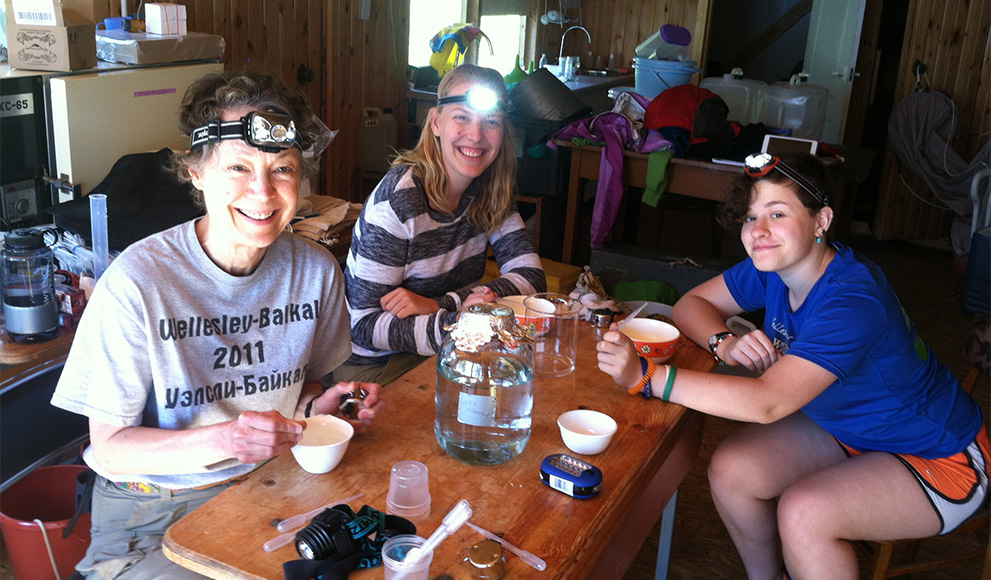Students Join Professor's Expedition To Study The Ecological Secrets of Lake Baikal

Lake Baikal, the oldest, deepest, largest, and most biodiverse lake in the world, provides extraordinary opportunities for learning and discovery. Students Bella Nikom '17 and Kristin Huizenga '16 got to experience that first hand this summer.
Nikom and Huizenga joined Marianne Moore, Frost Professor in Environmental Science and professor of biological sciences, on a summer expedition to Lake Baikal. Moore is involved in a long term collaboration with a team of 15 scientists from the USA and Russia who are exploring how Lake Baikal’s stunning biodiversity may respond to contemporary climate change. This summer, the team performed experiments to determine what the major grazer (a copepod, or tiny crustacean, called Epischura) eats.
"Epischura are tricky little creatures. They are both delicate and incredibly speedy—they should make a superhero that absorbs their teleporting abilities," Huizenga said. "It takes a lot of patience to move them one at a time, but it is well worth it, especially when you get to see them through a microscope."
Huizenga, a biological sciences and Spanish major, grew up on a lake but said Lake Baikal is unlike any other. "It is unique in so many ways, the most intriguing of all is the way that it functions more like an ocean than most lakes," she said. Huizenga is assisting Moore and Moore’s colleague, Bart De Stasio of Lawrence University, with their experiment. "In any given day I could be measuring rope, picking copepods, filtering water, or rowing out into the waves of Lake Baikal to deploy the experiment," she said.
Huizenga said the experience has been extraordinary for many reasons. "It is remarkable to visit Siberia, a part of the world that for most of my life has been so shrouded in mystery, and to get to experience Russian culture first hand while learning how other countries approach science," she said.
Nikom, a Jewish studies and computer science double major, is the team’s translator, a job that has many varied responsibilities. "I've had to translate some scientific documents from Russian to English, interpret a conversation between a Russian scientist and our professors regarding different species of ciliates, and find help when the light bulb in our bathroom went out," Nikom said.
Russian was Nikom’s first language. "I was emerged in Russian culture my whole life, but I've rarely gotten the chance to visit the land where all of my favorite foods, jokes, and customs come from," she said, adding that the trip has also helped her expand her vocabulary—mostly, she said, through the addition of slang learned from Russians she has befriended at the Biostation.
She's also expanding her scientific knowledge. Nikom said she was initially unsure of how she might assist the team beyond translating. "The whole biological team quickly brushed off all of my "non-scientific insecurities" and put me to work," she said. "You do not have to be a scientist to be able to do or understand science, all you need to be is interested."
Nikom and Huizenga also offered another bit of advice for travelers. "Flexibility and resourcefulness are essential when working in the field. Both of these things are helped by a good supply of duct tape and zip ties," Huizenga said. Nikom added, "Those two items saved us more times than I can count."
